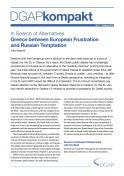This text continues a series of articles edited by Stefan Meister exploring Russia’s use of instruments of hybrid warfare since the Ukraine crisis and the annexation of Crimea.
“Greece belongs to the West.” With this slogan, Konstantinos Karamanlis, former Greek prime minister and president, laid the foundations for the principles of Greek foreign policy, anchoring his country firmly in the West. That was in the 1970s, after the collapse of the military junta. Since then, the European Union has been a central point of reference for Greece and has played a decisive part in the country’s democratic consolidation and modernization. However, the Greek debt crisis that broke out in 2010, the accompanying economic and social upheavals, and the tensions with European creditors over public debt have rocked the country.
The Greek public finds itself facing the uncomfortable questions of whether Athens can stick to European rules and meet European standards. As it does so, long forgotten tensions with Europe are coming to light, stirring up a new debate about Greece’s geopolitical orientation. This was also reflected in the election of the populist left-right coalition of prime minister Alexis Tsipras in January 2015.
While Greece examines its European identity, the topic of Russia’s involvement has also come under scrutiny in the European public sphere. Not only the deteriorating tone of the negotiations between Greece and its European creditors but also new awareness of how Moscow deploys “information warfare” in an attempt to influence public discussion in EU member states, fuel speculation about whether Greece could possibly become a Trojan horse for promoting Russia’s interests in the EU.
This analysis explores the predominating image of Russia within Greek society and the Greek political parties. To what extent does Moscow offer a genuine political alternative to Greece’s involvement with the EU and NATO? Which role does the “Russia factor” play in the Greek debt crisis? And can Russia really influence Greek politics, even if it means coming into confrontation with EU interests?
Read the full article here.

